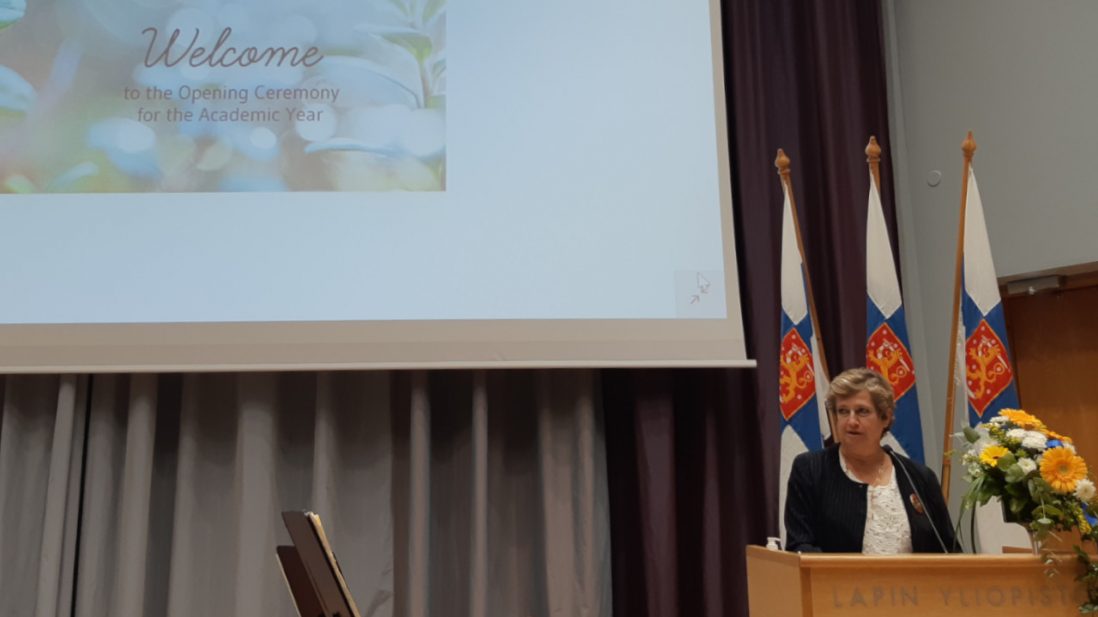Adress of MS Agnès CUKIERMAN, Ambassador of France in Finland
Opening of the 2021-2022 Academic year of Lapland University
Rovaniemi – September the 6th, 2021.
Dear Minister, dear Presidents of ULapland and UARtic, excellencies ,dear all,
It is a great privilege for me to be invited to open this Academic year 2021-2022 of Lapland University. Privilege enhanced by the fact that we are celebrating today the 20th anniversary of UArtic.
Let me first begin by stressing the amazing quality work done by ULapland bringing in the research work done internationally an intimate knowledge of the challenges of the Nordic regions. Be it in the field of education, law, social sciences or art and design ULapland’s work on the interactions between people and the environment in the Artic is of interest for everyone working in those fields. Its particular focus on global arctic responsibility or sustainable tourism is clearly in phase with the global reflexion on the consequences of climate changes for our society. At this precise time the summit of IUCN in Marseille is tackling the wide range of problems concerning the biodiversity that is suffering in the world. The works done by the Arctic Centre on Northern and Arctic issues take a leading part in that reflexion. With the increasing speed of the changes that are now clearly visible particularly in Arctic we need to tackle the socioeconomic transformation of the region in a comprehensive way. The work that ULapland amidst other members of UArtic is key on that topic to move to an environmentally and socially sustainable development society.
Dear Friends,
Let me now focus on the importance that my country attaches to developing high-level scientific cooperation particularly within a European framework
France has developed international cooperation with numerous universities in all the European countries and internationally. This cooperation has amplified in the last thirty to forty years and it has shown excellent results. With Finland, the numerous links, especially cultural and scientific ones, which we have forged historically, have speedily developed since Finland’s accession to the European Union.
Lapland University has a very special place in these Franco-Finnish exchanges. The privileged relationship that France maintains with your university is old. ULapland inspired in 2010 the French University Versailles Saint Quentin en Yveline, one of the two universities associated with the University of Paris Saclay which appears in 13th place in the latest Shanghai ranking of the best universities in the world. This French university opened a master’s degree in Arctic studies in 2010.The objective of the Master is to help future decision-makers and facilitators working in the Arctic or in relation to the Arctic to develop integrated analysis tools thanks to a thorough knowledge of the fragile balance between ecosystems and the human ecology of the Arctic. And From the start, UVSQ, but also Aix-Marseille University, have developed an intensive cooperation with ULAPLAND on many topics.
As far as ULapland University is concerned French universities have built cooperation in different sectors.
In the fields of education and art ULapland and Aix-Marseille University have had many exchanges and a good cooperation to build up joint projects. They are now planning an agreement on exchange of teachers between the two structures at Master level, under the impulse of Jean Arnaud, professor of plastic art at the University of Aix-Marseille whom some of you might have met when he came last June to Rovaniemi to discuss this project.
More recently a cooperation is developing in the environmental sector with UPSaclay University. Our interest, of course, is in Arctic issues. An anthropologist working for many years at the ULapland Artic Center, Florian Stammler, is going next fall to UPSaclay University, sponsored by the French Institute in Finland.
All these exchanges reflect the great interest in the academic and scientific activities of ULapland and more generally in Arctic issues.
I have also been told that ULapland University is considering joining UPSaclay’s European university alliance Eugloh, on Global Health. I hope this will happen very quickly because this cooperation touches on very broad topics ranging from nutrition to technology or management. University of Lapland could certainly contribute to promote “Artcic Health”.
But there is no sustainable scientific cooperation without student mobility! France is one of the main host countries for international students with 370,000 foreign students on exchange or graduate mobility. And I would like to point out that while studies at the undergraduate level are taught mainly in French, at the master level studies can be done in many disciplines in English.
We will be very happy to have more Finnish students coming to France for short or longer periods.
And we will be happy to strengthen exchanges between ULapland professors and French university professors, between finnish and French scientists. The arctic today faces many threats. It’s why it’s so important to set up high-level global collaborations to be ready to tackle many new challenges. The French scientist Sébastien Gadal, Professor of Geography in Spatial Analysis and Geomatics at the University of Aix-Marseille, among other speakers will give this afternoon his contribution to the understanding of those challenges.
France and Finland are committed together in this direction.
I wish you all, researchers, professors, ULapland University staff, and of course students, a plaisant and successful academic year./.
